Updated on
This article is geared towards helping cat lovers to understand why their cat may not be eating. These are only possible reasons for the change in appetite and is not directed towards diagnosing.
Always seek help from your licensed veterinarian if you notice your cat is losing weight drastically or is not eating after a certain amount of time. Continue reading to find out everything that should be taken into consideration, from the proper care to the food they eat.
Contents
Reasons Why Cats Are Thin
Picky Eating
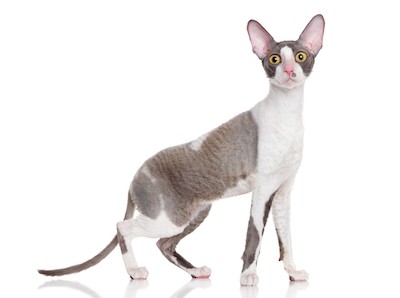

Your cat might be picky when it comes to eating what is in their food bowl. Most cats are regarded as picky eaters, mainly if they are not used to a new kind of food. Some cats might either pick through the cat food or could choose to leave it behind during mealtime.
Malnourishment
One of the most common reasons why a cat is underweight is due to a lack of nutrition. The food intake might be sufficient, however, what the cat eats might be what is lacking in essential nutrients.
Suffering from Illness
Drastic loss of weight or lack of appetite is considered a symptom of any disease. If your cat is suffering from a condition making them feel uncomfortable and unable to eat, then it is very important you schedule the soonest appointment with your veterinarian. This can be especially detrimental to older cats.
These are a couple of possible explanations for your cat's lack of appetite or cause of weight loss. Seek help from your veterinarian for diagnoses and treatment.
Why has my cat stopped eating?
1. Your cat has become a picky eater
Did you know that low-quality kibble contains poor vitamins, protein, minerals, and other essential nutrients? You can tell that it is a low-quality cat food if it does not have the list of the protein source as the main ingredient or if the sources of meat and protein are by-products. For instance, chicken or beef by-products. A by-product is a non-rendered part of an animal that does not include meat. A by-product of an animal include the tongue, spleen, stomach, etc. By-products will usually be in an animal's food, however, it should not be the main source of protein.
Have you recently started giving your cat wet food, tuna, or any other foods besides their normal meals? If “better” foods are made available to your cat, they may stop eating in hopes you will only feed them the desired, nontraditional food. Another possible alternative is that your cat simply does not like the food given. Another kind of cat food may need to be purchased. Keep in mind, many pet stores that sell food allow you to return unused food if you have a picky eater or your pet does not like the food.
2. Incorrect food type
This touches on the fact that your cat may not like the food given. If the quality of the food is low, your cat may not eat it. Another possibility is that your cat is eating the food but not gaining any nutritional value from the food. Low-quality foods can have minimal nutrition and may not give your cat the essential nutrients it needs to grow and maintain their body.
3. Your cat may be sick
If your cat has skipped a couple of meals, there may be more going on. If your cat is showing abnormal behavior that deviates from their routine and behavior, they may not be feeling well. This can be especially detrimental to older cats. This is when you should consult your veterinarian to find out what is wrong as soon as possible.
How to Fatten a Cat: Steps to take
1. Switch to a high-quality cat food
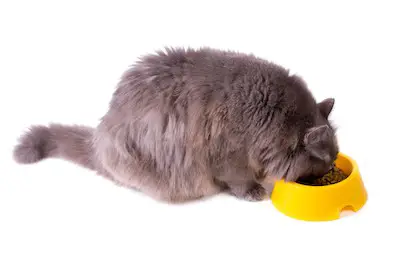

To help your feline gain weight, avoid foods with by-products, corn, or wheat gluten meals as the first ingredients. When reading any pet food label, the ingredients that are more plentiful in the food are listed first. The ingredients that aren’t in a higher amount in the food are listed later in the list.
Excellent proteins that should be listed higher in the list are tuna, chicken, barley, turkey, corn, and dried egg. Fish meal and soybean meal also contain good essentials fatty acids that are important for your cat's health. Ground whole grain corn is another ingredient to look for in your cat's food. This is essential for cat energy.
Buying a higher quality cat food will ensure your pet is getting the nutrient it needs. High-quality ingredients in cat food may be more expensive but the benefits of buying a better value cat food will out way the cost in the long run.
There are also a number of benefits to feeding your cat a higher quality food such as increased, healthy weight gain, and a shinier and softer coat. Your cat may experience a decrease in digestion issues as well.
2. Add kitten food to your cat's meal
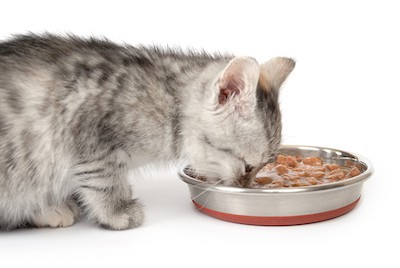

You may be instructed by your vet to feed your cat kitten food. This is because kitten food is a lot higher in calories, proteins, vitamins, and minerals since it is made for a growing cat. It is not recommended to replace your cat’s food with kitten food but simply add to their meal. This is a budget-friendly remedy but should only be used temporarily to get your cat back on track with their weight.
Do not replace your cat's food with kitten food, as it may not switch back to their regular food.
3. Use wet canned food or other types of cat palate enhancers
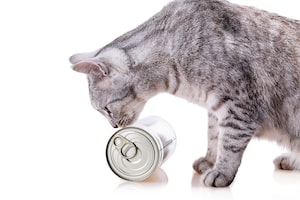

Also referred to as a wet food diet, canned cat food diet (or canned kitten food) is another excellent choice to aid in weight gain. Wet canned food is high in water content, easier to digest for a cat, and has a strong smell that may entice the cat to eat. They can also be higher in calories as well. Other types of palate enhancers are canned tuna, and other foods that have high fish smells that cats love. This should be mixed with your cat's regular hard food, so it does not become dependent on wet food. Canned food is an excellent choice for older cats that might have lost teeth or those that have a hard time digesting hard food.
4. Offer Treats In Between Meals or Throughout the Day


Offering treats throughout the day and in between meals may help stimulate your cat's appetite. Recommended cat treats are fish treats that come in packages at pet stores or small pieces of cooked meats like chicken or turkey can be given as well.
Treats should be given in moderation and not used to supplement any meals. If you notice your cat gaining excess weight, lower the treat and food quantity accordingly.
5. Feed your cat more food
Always follow your veterinarian recommendation for food portions for your cat. Cat food labels also provide recommended feeding guides for extra assistance.
Foods to Avoid
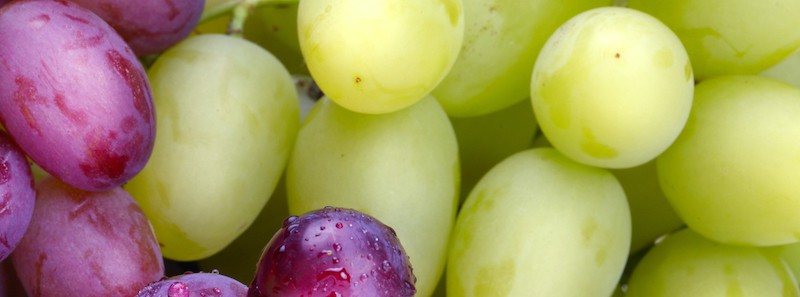

Of course, aside from giving your cat the best foods that they deserve, you should also learn the foods that might harm them.
Some of the foods that should be avoided are the following:
- any human food other than poultry
- dairy products such as milk, yogurt or cheese
- onion, garlic
- chocolate, caffeine
- dog food
Home Care and Treatment Tips
Your veterinarian will need to take a urine, and/or blood sample as well as a physical examination to diagnose any problems your cat may be experiencing.
Possible diagnoses:
- Gastrointestinal issues
- Food allergies
- Current cat food problems
- Lack of appetite
Final Thoughts
It is important to know how to care for your pet. Following veterinarian food guidelines as well as establishing a regular food schedule for your cat is essential in keeping your pet healthy.
If symptoms have just presented themselves, simple home remedies such as feeding tuna and other high fish smelling treats may be all your cat needs to stimulate their appetite. If symptoms proceed, medical attention is needed.
I hope this information containing simple tips and tricks help!
References:
“5 Dangerous Foods You Should Avoid Giving Your Cat: Hill's Pet.” Hill's Pet Nutrition, www.hillspet.com/cat-care/nutrition-feeding/toxic-foods-for-cats.